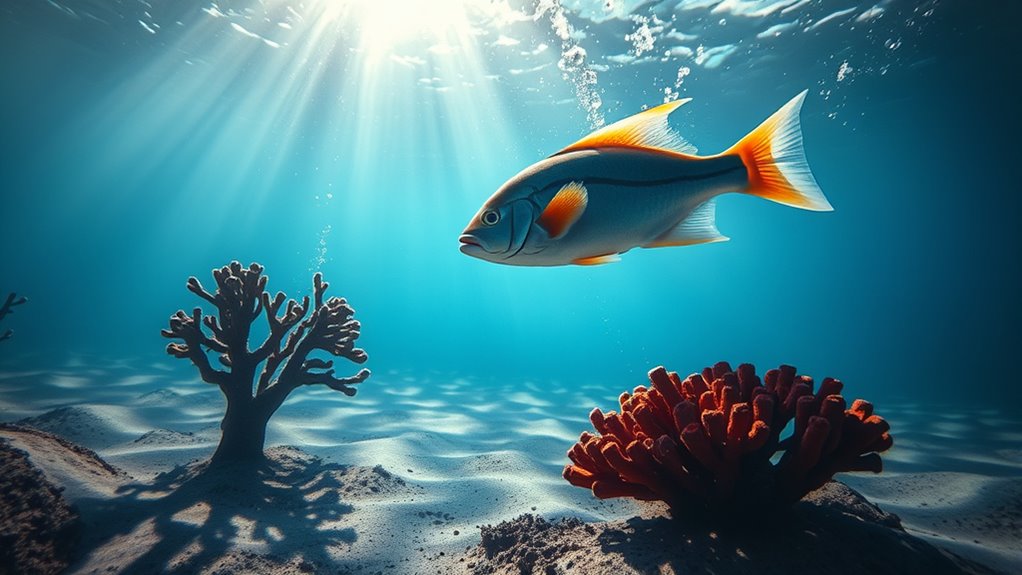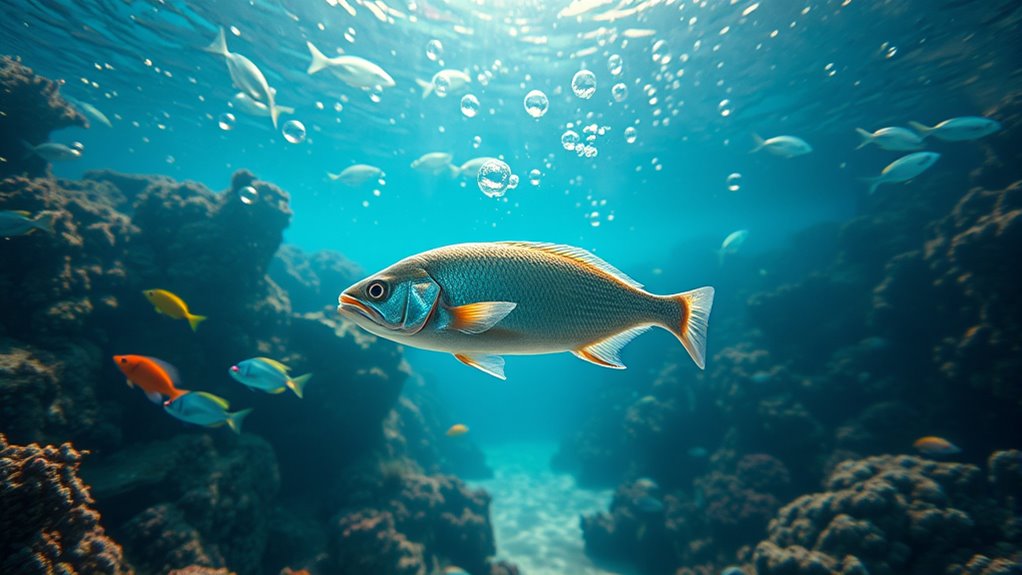Yes, fish can “drown” in a sense. They can suffer from oxygen deprivation, even while surrounded by water. If their gills can’t extract enough oxygen due to poor water quality or other issues, they can suffocate. You’ll notice them gasping at the surface or behaving erratically when this happens. Most fish can’t handle prolonged low oxygen levels, making a healthy environment essential. Want to know more about how to keep your fish healthy?
Key Takeaways
- Fish can “drown” through oxygen deprivation when their gills cannot extract enough oxygen from the water.
- Poor water quality, pollution, and overcrowding can lead to low oxygen levels, risking fish suffocation.
- Signs of oxygen deprivation include gasping at the surface, lethargy, and erratic movements.
- Certain species, like lungfish, can tolerate low oxygen by gulping air, but most fish cannot.
- Maintaining a healthy environment with good water quality is essential to prevent oxygen depletion and support fish survival.

Have you ever wondered if fish can drown? It’s a fascinating question, especially considering how much time you might spend observing these creatures swimming effortlessly in water. While fish are aquatic animals designed to live in water, they can indeed face a critical situation that resembles drowning: oxygen deprivation. This occurs when their gill function is impaired, making it impossible for them to extract the oxygen they need from the water.
Fish breathe by passing water over their gills, where tiny blood vessels absorb oxygen. Under normal circumstances, this process works smoothly, allowing fish to thrive. However, if the water lacks sufficient oxygen, or if their gills become damaged or obstructed, fish can experience distress. Just like you’d struggle to breathe in a low-oxygen environment, fish can suffer from the same fate. When they can’t get enough oxygen, they’re effectively drowning, even if they’re surrounded by water.
Fish rely on their gills to absorb oxygen from water, but low oxygen levels or gill damage can lead to distress and drowning.
You might think that fish are always safe in their aquatic habitat, but various factors can lead to oxygen deprivation. For instance, pollution, excessive algae growth, or even overcrowded tanks can deplete oxygen levels. When water quality declines due to these conditions, fish may find themselves gasping for air at the water’s surface, desperately trying to breathe. Their gill function becomes compromised, and they can suffer as a result.
Interestingly, some fish are more resilient than others. Certain species, like the lungfish, can survive periods of low oxygen by gulping air from the surface. However, most fish aren’t equipped to handle such stress, and their chances of survival diminish rapidly. You might observe them struggling, darting back and forth, or even slowing down—these are signs that they’re in trouble. Alongside the importance of maintaining water quality, creating a healthy environment is essential for fish to thrive.
Frequently Asked Questions
Do Fish Sleep Like Land Animals Do?
Yes, fish do sleep, but it’s different from how land animals sleep. You’ll notice their fish sleep patterns involve periods of reduced activity and responsiveness. They often find a safe spot among plants or rocks, where they can rest. Their aquatic rest behaviors include slowing down their movements and sometimes hovering in place. So, while they don’t close their eyes like you do, they definitely engage in restful states to recharge.
How Do Fish Breathe Underwater?
Did you know that fish can extract about 80% of the oxygen from water? Fish breathe underwater through a process called fish respiration, using specialized organs called aquatic gills. When water flows over these gills, they absorb oxygen and release carbon dioxide. You might find it fascinating that some fish can even breathe air, adapting their gills to survive in low-oxygen environments. This remarkable ability allows them to thrive in diverse aquatic habitats.
Can Fish Survive Out of Water?
Fish can’t survive out of water for long. Their aquatic adaptations, like gills, allow them to extract oxygen from water, but without it, they suffocate. If you see a fish out of water, it shows distress; its behavior is often erratic as it struggles to breathe. While some species can tolerate brief periods in low water conditions, they ultimately need their aquatic environment to thrive and stay alive.
What Are the Signs of a Stressed Fish?
If you notice your goldfish darting around the tank like it’s in a frenzy, it’s a sign of stress. Stressed fish often exhibit erratic behavior, like hiding or spending too much time at the surface. Poor water quality can exacerbate this issue, leading to lethargy or unusual swimming patterns. Monitoring your fish behavior and ensuring a clean environment can help keep them healthy and happy, reducing stress levels considerably.
Do Different Fish Species Require Different Water Conditions?
Yes, different fish species require different water conditions. You need to take into account their specific fish habitat and the water chemistry for ideal health. Some fish thrive in acidic water, while others prefer alkaline conditions. Temperature, salinity, and oxygen levels also play vital roles. By understanding these needs, you can create a suitable environment that promotes growth and reduces stress, ensuring your fish stay happy and healthy in their aquatic home.
Conclusion
In the depths of water, fish symbolize freedom, yet they can suffocate in the wrong conditions, much like we can feel trapped in our own lives. Just as a fish needs clean, oxygen-rich water to thrive, we need healthy environments to breathe and flourish. So, as you ponder whether fish can drown, remember that every creature, including you, needs the right surroundings to survive. Protect your space, and you’ll swim through life with ease and grace.









